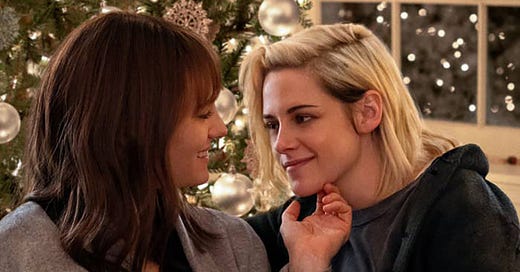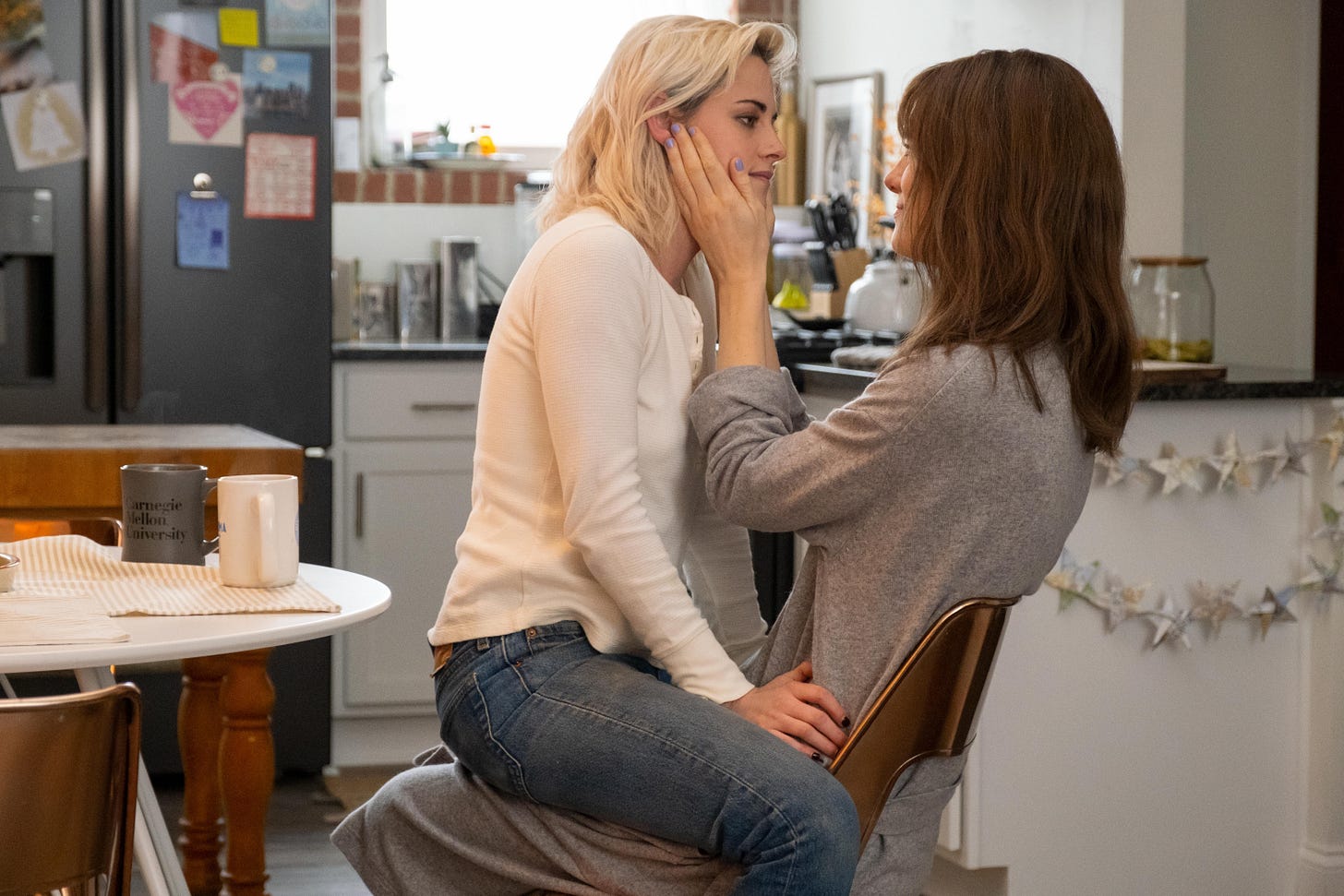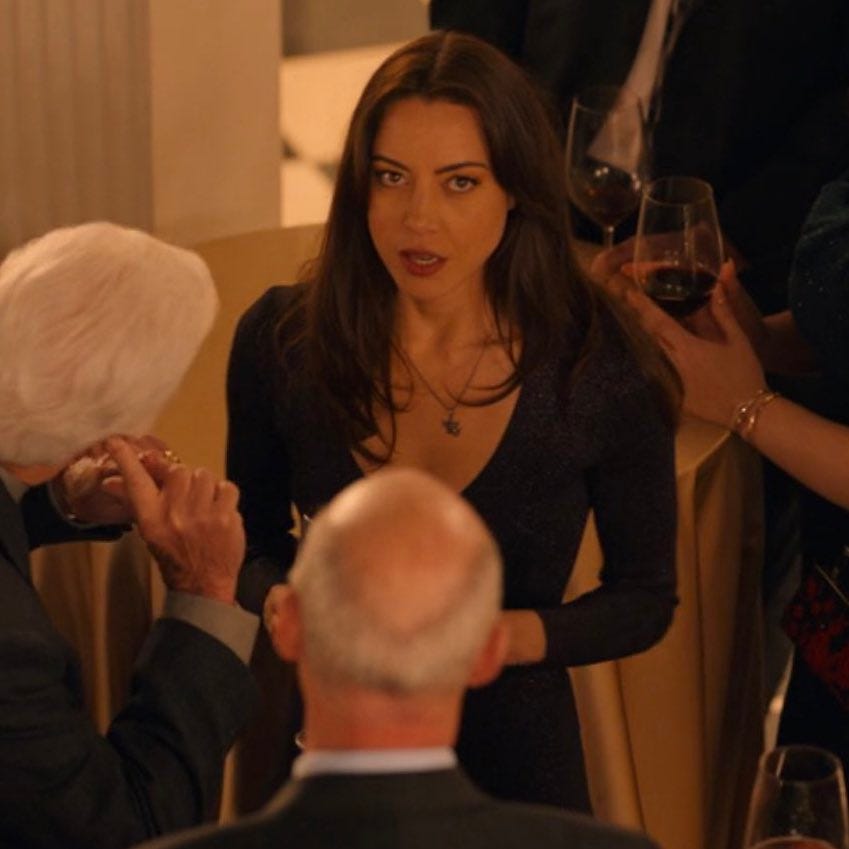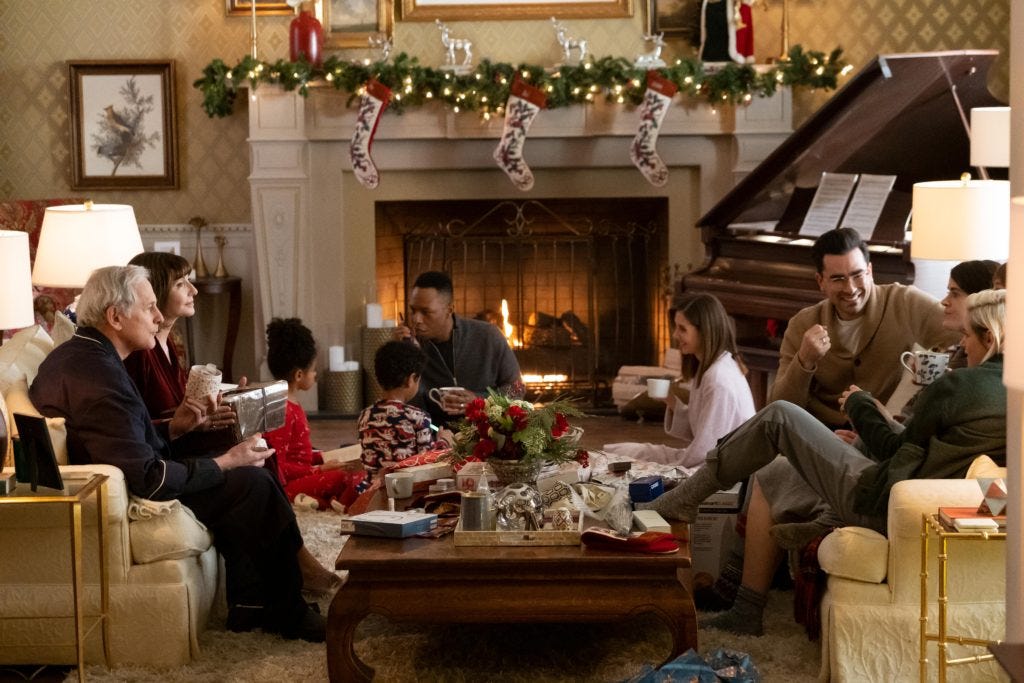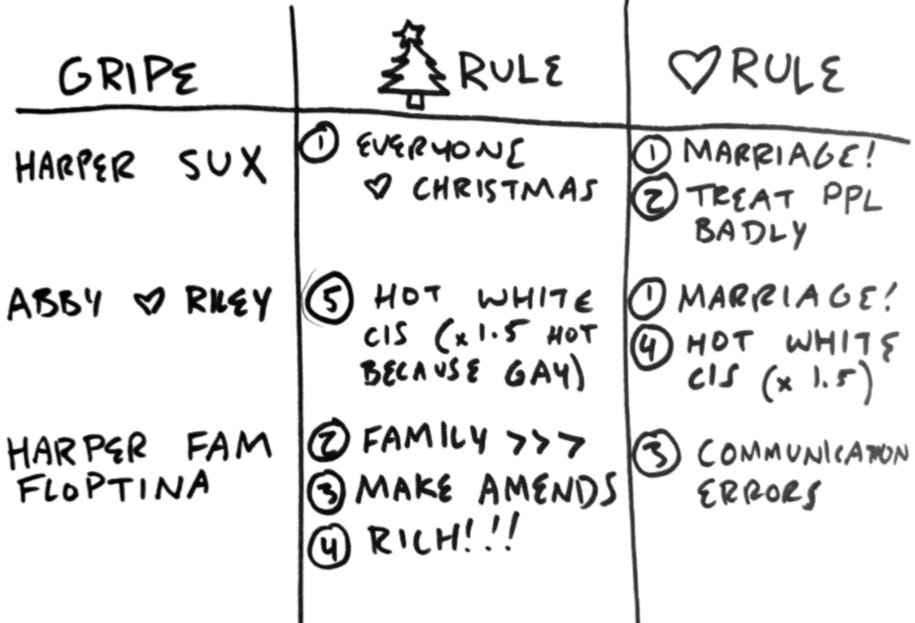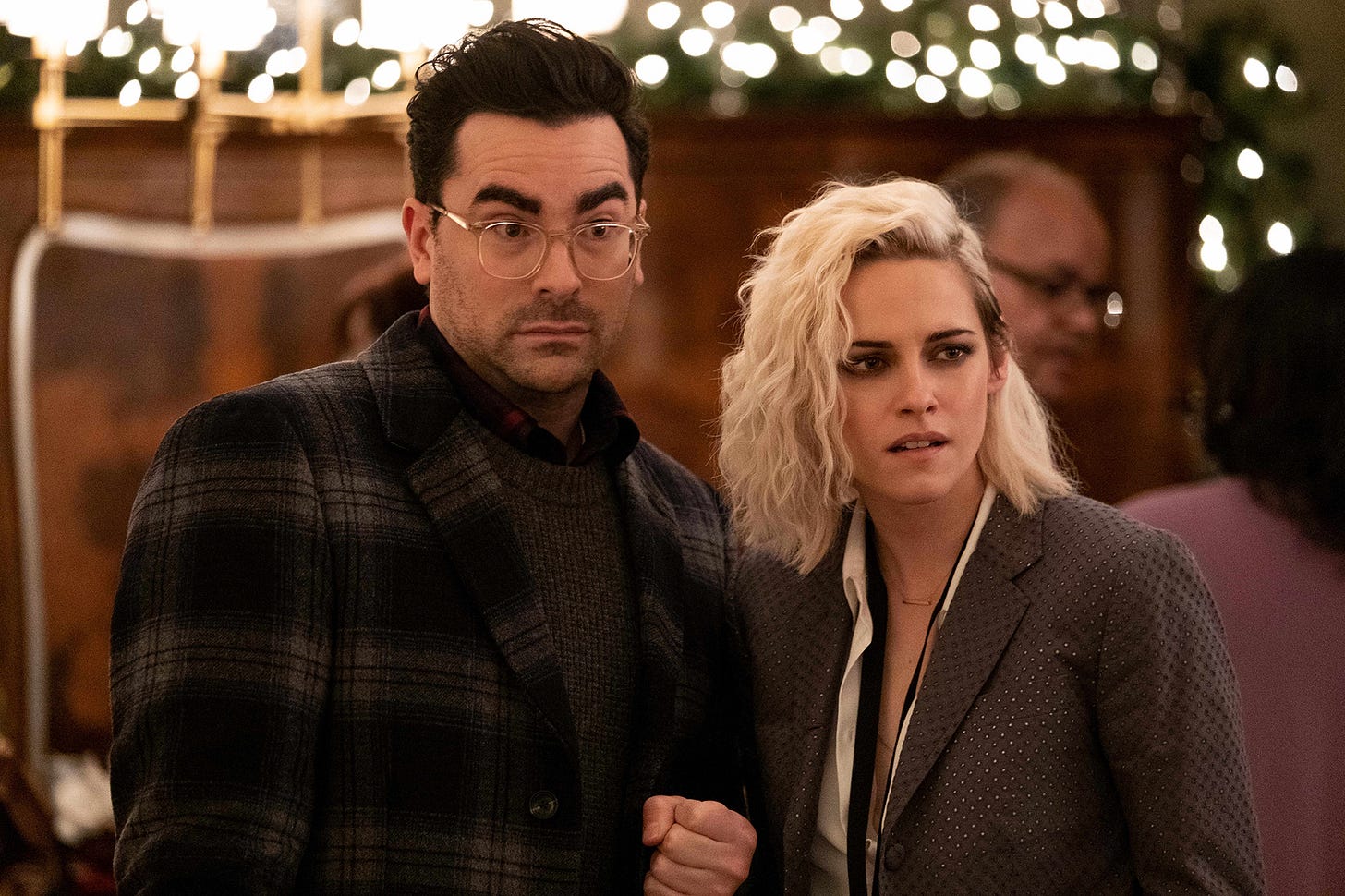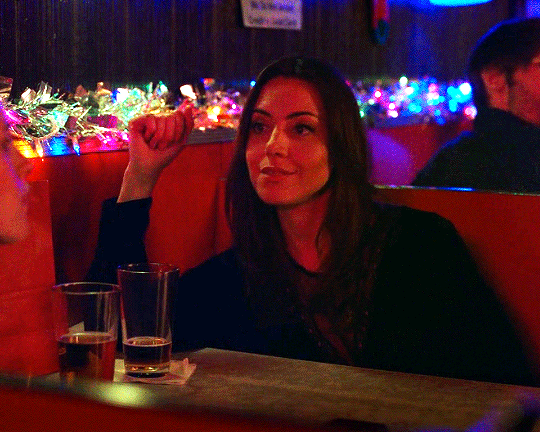I am a "Happiest Season" apologist
Don't hate the player, hate the crushing weight of genre/gender
I remember it like it was yesterday: November 2020, everyone’s hair either very shaggy or buzzed off, the elastic on our hastily acquired cloth masks starting to wear out. But there was a shiny, stylish, sapphic light at the end of the tunnel: Happiest Season, a.k.a. the lesbian Christmas rom com to save us all.
It was to feature several big-name white women with extremely symmetrical faces (Kristen Stewart, Aubrey Plaza, Mackenzie Davis, Alison Brie). We would witness immaculate cozy elegance and aspirational wardrobes. There were at least 3 gay characters! Higher production value than most of the Hallmark or Netflix slop! Some self-awareness about the patriarchy, etc.! We were frothing at the mouth.
But upon further reflection, people realized it was kind of bad.
The exact degree of the movie’s awfulness has been a perennial Topic of Discourse every year since. I am here to defend its honor.
A summary of people’s (rightful) gripes surrounding Happiest Season
There are many, but they fall into 3 main buckets:
Harper sucks—Like really, really sucks. It’s almost impossible to overstate how much she sucks. Harper (Mackenzie Davis) bamboozles Abby (KStew) into recloseting herself and hiding their relationship just to appease Harper’s conservative family during Christmas. She then proceeds to alternate between ignoring Abby and belittling her. We later learn she outed her ex girlfriend, the flawless Riley (Aubrey Plaza). Harper? More like Flopper!
Abby should’ve ended up with Riley, not Harper—It’s one thing for Flopper to suck. It’s another for a third character to be so much better than her in every way and have intense, undeniable chemistry with Stewart’s character.
Harper’s family sucks—Harper’s family treats Abby like garbage. They’re posh and out of touch. Her sister outs her. Her father “needs some time” after Harper comes out/is outed, and everyone else is cold and weird! The dad is also literally a conservative politician running for office during the events of the film, making speeches about upholding traditional family values. The degree of nastiness is almost as intense as The Family Stone (a truly bad film).
But these issues with Happiest Season are not actually issues with the film itself. They’re more qualms with 2 of the most well-cemented genres in American cinema—the Christmas movie and the rom com—and how difficult it is for queer narratives to fit securely into those genres and still subvert them in any meaningful way.
The movie’s biggest flaw is dancing the genre dance a little too well, dutifully hitting all the well-trod beats but in gay little shoes that highlight how ridiculous some (most?) of those beats are. And for that I can forgive it.
Let’s look closer at those genre rules.
Christmas Movie Requirements (CMRs)
All protagonists must like Christmas by the end of the movie.
This is particularly effective if one person (Abby) dislikes Christmas at the beginning of the movie due to Trauma (dead parents).
The family unit must be venerated.
This is distinct from simply conflict and resolution. Family members must treat each other badly, but in the end uphold both their individual relationships and the institution of the nuclear family, usually in a very self-aware way (“family is everything!”).
In doing so, the room must become fuller. Families must physically come together at the end.
Amends must be made, and fast. Preferably by midnight on December 24.
Someone must be wealthy.
This can be a plot vehicle, a nice aspirational backdrop, or both.
The protagonists must be deemed palatable.
They must be straight, cisgender, and all women must be Guy Hot. Whiteness strongly encouraged. If not straight, must be at least 1.5x Guy Hotter to compensate.
Romantic Comedy Requirements (RCRs)
Marriage, or the promise of marriage, must be affirmed and upheld.
This is me applying what I remember of an Early Modern Drama course I took over a decade ago. JSTOR it idk.
The protagonists must, within reason, treat each other badly.
It is helpful if one of the romantic leads, usually the man, acts disproportionately worse. In Happiest Season, boy howdy is it Harper!
There must be at least one significant communication error.
A combination of truthfulness and deceit is useful.
Example: “I was lying about THAT but I wasn’t lying about MY FEELINGS FOR YOU” (no shade; I legitimately love this one).
As in Christmas movies, all protagonists must be deemed palatable.
They must be straight, cisgender, and all women must be Guy Hot. Whiteness strongly encouraged. If not straight, must be at least 1.5x Guy Hotter to compensate.
Deconstructing the gripes
Considering the cumulative demands of both these genres on any movie that attempts to subscribe to them, here’s how each primary beef with Happiest Season is actually an issue with the genre(s) as a whole.
Gripe 1: Harper sucks
True, she is really, really bad. More specifically, Harper outed Riley years ago and never apologized, manipulated/ignored/closeted/generally made this trip hell for Abby without batting an eye, is awful to her sisters, and loooooves whining. But all this serves to fulfill RCR #2: people must treat each other badly. It’s worth noting she sucks about the same amount as a lot of male rom com protags.
She is also the person Abby explicitly intends to marry, so she must prevail (RCR #1).
Finally, see CMR #1: protagonists must love Christmas at the end. Harper sucks, but she loves Christmas more than anyone in the movie, and Christmas must win, so Abby must choose Harper and, by proxy, Christmas, regardless of suckage.
Gripe 2: Abby should’ve ended up with Riley
This is almost entirely due to the one-two punch of RCR #4 and CMR #5. These twin “must be hot” rules combined in power and did not know their own strength. I bend the knee.
See also RCR #1: marriage must be upheld. Riley is not the marrying type, so she cannot win. She must be repurposed to support the endgame of Abby x Christmas.
Gripe 3: Harper’s family sucks
This beef is perhaps the most heavily influenced by the burdens of both genres. Obviously, we’ve got CMR #2: the family unit must be venerated. The movie could not end with Harper taking some time away from her family. Combined with CMR #3 (making amends), this means that no matter how much her family blows and does not really deserve such quick and total forgiveness, it must be granted. It’s Christmas!!!
As far as the whole class dynamic (and constantly calling Abby an orphan), that’s just CMR #4. We needed some source of visual wealth—lavish parties, pretty lights, luxe outfits. The movie delivered, even if it meant making these people Republican.
The family also plays an interesting role in fulfilling RCR #3 (communication errors). For this one, Happiest Season defaulted to the most obvious communication error in queer romance: the messiness of coming out, a concept invented by straight people. Such a spectacle needs an audience, needs stakes. If the family was even a little less awful, the conflict wouldn’t land.
IN CONCLUSION:
My problematic fave <3
So yeah, Happiest Season doesn’t do full justice to its characters, some of the best onscreen chemistry I’ve ever seen, and audiences who were hungry for something a little less yikes. However, this disservice is only because the movie was trying so hard to join the ranks of 2 such monolithic and historically conservative genres. If it didn’t make those compromises, would it have gotten the attention it did, been generally welcomed into the Christmas and rom com genres the way that it has been over the past 3 years?
Happiest Season became a victim of its own hype and our probably-extrapolative expectations: we decided it would be subversive because it’s queer, and for better or worse, queer still automatically means a degree of subversion. But there are only so many Subversion Tokens mainstream movies get, and the film’s lesbianism used ‘em all up—there was no room to challenge any of the other genre elements, which is what ultimately pissed people off.
But at a few years’ distance, the backlash seems like more of a reckoning with what studios think is marketable, how much farther we have to go, and how much more opportunity there is to create new and interesting patterns, than an issue with the movie itself. The gays no longer get buried, and now we’re asking them to suck a little less, claim a little genre wiggle room. And to maybe get a better wig.
I believe genres can evolve, and Happiest Season is a frustrating but still useful step in the Hollywood journey from Carol to an anticolonial trans furry nutcracker version of Suspiria in wide release. In the meantime, I will watch this lovable mess multiple times a year for the sock-sliding scene1 and for Aubrey Plaza in the booth at the drag show.
I cannot for the life of me find a video or gif of this, but near the beginning there’s a half-second shot of Abby excitedly sliding across the kitchen floor to pour some coffee. It is cinema.

